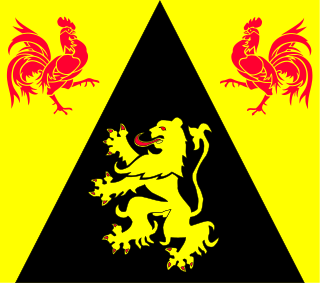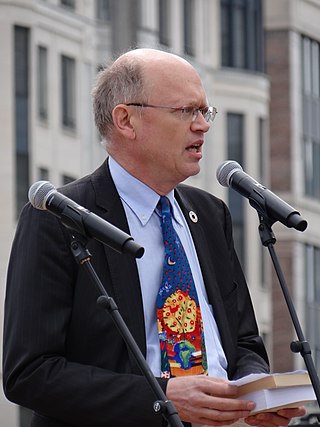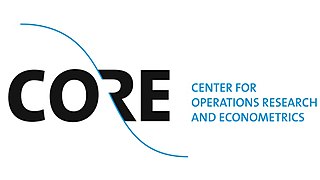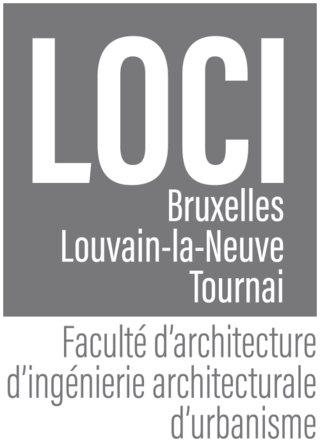
Walloon Brabant is a province located in Belgium's French-speaking region of Wallonia. It borders on the province of Flemish Brabant and the provinces of Liège, Namur and Hainaut. Walloon Brabant's capital and largest city is Wavre.

UCLouvain or Université catholique de Louvain is Belgium's largest French-speaking university. It is located in Louvain-la-Neuve, which was expressly built to house the university, and Brussels, Charleroi, Mons, Tournai and Namur. Since September 2018, the university has used the branding UCLouvain, replacing the acronym UCL, following a merger with Saint-Louis University, Brussels.
Fle3 is a Web-based learning environment or virtual learning environment. More precisely Fle3 is server software for computer supported collaborative learning (CSCL).

The Louvain School of Management is the international business school of the University of Louvain (UCLouvain), Belgium, founded in 1897. The faculty offers courses on the campuses of Louvain-la-Neuve, UCLouvain FUCaM Mons and UCLouvain Charleroi.
The Belgian American Educational Foundation (BAEF) is an educational charity. It supports the exchange of university students, scientists and scholars between the United States and Belgium. The foundation fosters the higher education of deserving Belgians and Americans through its exchange-fellowship program. Since 1977, Dr. Emile Boulpaep is the president of the BAEF.

UCLouvain Saint-Louis Brussels is an autonomous university campus specialized in social and human sciences part of UCLouvain and based in Brussels, Belgium.

Jean-Pascal van Ypersele de Strihou is a Belgian academic climatologist. He is a professor of Environmental Sciences at the UCLouvain (Belgium). As a previous vice-chair of the IPCC, Van Yp is one of the forerunners of climate change mitigation through strong decrease of fossil fuel consumption.

Michel Weber is a Belgian philosopher. He is best known as an interpreter and advocate of the philosophy of Alfred North Whitehead, and has come to prominence as the architect and organizer of an overlapping array of international scholarly societies and publication projects devoted to Whitehead and the global relevance of process philosophy.
Elium, previously referred to as Knowledge Plaza, is a Software as a Service used for enterprise knowledge sharing within organisations. It supports use cases for knowledge management, social bookmarking, document management, wikis and internal social network. It was initially designed as an information management tool for knowledge workers and is often used for collaborative research projects, market intelligence, information brokerage, etc.
The Academicus Neo Lovaniensis Ordo, is a mixed student corporation which is composed of present and alumni students of the University of Louvain (UCLouvain). It was founded on 26 September 1991.
A theme-based shared flat is a unique concept created by the University of Louvain (UCLouvain) which consists in between six and twelve students sharing a "kot" and working together on a project. The project lasts for one (academic) year and can embrace cultural, social or humanitarian activities. There is a total of about 130 KàPs in Belgium gathering more than 1000 students. For example, one of them helps primary school students for their courses, another one takes care of handicapped people and yet another one is organizing sport events in Louvain-la-Neuve. Exchange students are particularly keen to find a place in one of these KàPs because it is an opportunity to integrate the Belgian culture and improve their French. As a result, some of the KàPs have a room reserved for exchange students only.

OER Commons is a freely accessible online library that allows teachers and others to search and discover open educational resources (OER) and other freely available instructional materials.
Jean-Marie De Ketele is a Belgian academic and writer specialising in education. In addition to academia, he has held positions for United Nations agencies.

The Center for Operations Research and Econometrics (CORE) is an interdisciplinary research institute of the University of Louvain (UCLouvain) located in Louvain-la-Neuve, Belgium. Since 2010, it is part of the Louvain Institute of Data Analysis and Modeling in economics and statistics (LIDAM), along with the Institute for Economic and Social Research (IRES), Louvain Finance (LFIN) and the Institute of Statistics, Biostatistics and Actuarial Sciences (ISBA).

The Marie Haps Faculty of Translation and Interpreting is a faculty of Saint-Louis University, Brussels (UCLouvain) located on its own campus in Brussels' European Quarter, in the municipalities of Ixelles and the City of Brussels. It is Belgium's oldest translation school, founded in 1955, and the fifth faculty of Saint-Louis University, Brussels, which it fully merged with in 2015.

UCLouvain Charleroi is a campus of the University of Louvain in Charleroi, Belgium. Consisting of 3 faculties and a series of research centers and institutes, UCLouvain Charleroi consists of the Maison Georges Lemaître, in the center of the city, and a branch in Montignies-sur-Sambre.

The Faculty of Economic, Social and Political Sciences and Communication (ESPO) is a faculty of the University of Louvain, located on the campuses of Louvain-la-Neuve, FUCaM Mons and UCLouvain Charleroi. It originates in the School of Political and Social Sciences founded by Jules Van den Heuvel in Louvain in 1892. With over 6000 students, it is UCLouvain's largest faculty.

The Louvain School of Engineering or École polytechnique de Louvain (EPL) is a faculty of the University of Louvain, Belgium, founded in 1864. Known as the Faculty of Applied Sciences prior to 2008, it currently operates on the campuses of Louvain-la-Neuve and UCLouvain Charleroi.

The Faculty of Architecture, Architectural Engineering and Urban Planning, often called LOCI, is the 14th faculty of the University of Louvain, Belgium. It became an independent faculty in 2009, with the merger of three institutes founded between 1867 and 1882, and is active in Brussels (Saint-Gilles), Tournai and Louvain-la-Neuve.









